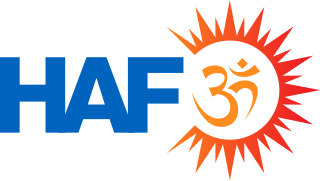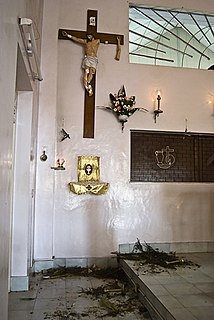A hate crime is a prejudice-motivated crime which occurs when a perpetrator targets a victim because of their membership of a certain social group or race.
Hate speech is defined by the Cambridge Dictionary as "public speech that expresses hate or encourages violence towards a person or group based on something such as race, religion, sex, or sexual orientation". Hate speech is "usually thought to include communications of animosity or disparagement of an individual or a group on account of a group characteristic such as race, colour, national origin, sex, disability, religion, or sexual orientation".
Religious persecution is the systematic mistreatment of an individual or a group of individuals as a response to their religious beliefs or affiliations or their lack thereof. The tendency of societies or groups within societies to alienate or repress different subcultures is a recurrent theme in human history. Moreover, because a person's religion often determines his or her morality, world view, self-image, attitudes towards others, and overall personal identity to a significant extent, religious differences can be significant cultural, personal, and social factors.
Persecution is the systematic mistreatment of an individual or group by another individual or group. The most common forms are religious persecution, racism and political persecution, though there is naturally some overlap between these terms. The inflicting of suffering, harassment, imprisonment, internment, fear, or pain are all factors that may establish persecution, but not all suffering will necessarily establish persecution. The suffering experienced by the victim must be sufficiently severe. The threshold level of severity has been a source of much debate.
The Bajrang Dal is a religious militant organisation that forms the youth wing of the Vishva Hindu Parishad (VHP). It is a member of the RSS family of organisations. The ideology of the organisation is based on Hindutva. Founded on 1 October 1984 in Uttar Pradesh, it has since spread throughout India, although its most significant base remains the northern and central portions of the country. The group runs about 2,500 akhadas, similar to the shakhas (branches) of the Rashtriya Swayamsevak Sangh. The name "Bajrang" is a reference to the Hindu deity Hanuman.
Freedom of religion in India is a fundamental right guaranteed by Article 25-28 of the Constitution of India. Modern India came into existence in 1947 and the Indian constitution's preamble was amended in 1976 to state that India is a secular state. However, in S.R Bommai v. Union of India, Supreme Court of India ruled that India was already a secular state from the time it adopted its constitution, what actually was done through this amendment is to state explicitly what was earlier contained implicitly under article 25 to 28. Every citizen of India has a right to practice and promote their religion peacefully. However, there have been numerous incidents of religious intolerance that resulted in riots and violence, notably, the 1984 Sikh Genocide in Delhi, 1990 Anti-Hindu riots in Kashmir, 2002 Gujarat Riots and the 2008 Anti-Christian riots in Odisha. Some perpetrators of the 1984 Sikh Genocide in Delhi have not been brought to justice despite widespread condemnation.
Hindus have experienced historical and current religious persecution and systematic violence. These occurred in the form of forced conversions, documented massacres, demolition and desecration of temples, as well as the destruction of educational centres.

The Hindu American Foundation (HAF) is a Hindu American advocacy group founded on September 3, 2003 and headquartered on Capitol Hill in Washington, D.C.. HAF is involved in the areas of human rights, civil rights and education among others.
Human rights in India is an issue complicated by the country's large size and population, widespread poverty, lack of proper education, as well as its diverse culture, despite its status as the world's largest sovereign, secular, democratic republic. The Constitution of India provides for Fundamental rights, which include freedom of religion. Clauses also provide for freedom of speech, as well as separation of executive and judiciary and freedom of movement within the country and abroad. The country also has an independent judiciary and well as bodies to look into issues of human rights.
Anti-Hindu sentiment, also known as Hinduphobia or Anti-Hinduism, is a negative perception, sentiment or actions against the practice and practitioners of Hinduism.
Hate crime laws in the United States are state and federal laws intended to protect against hate crime. Although state laws vary, current statutes permit federal prosecution of hate crimes committed on the basis of a person's characteristics of race, religion, ethnicity, nationality, gender, sexual orientation, gender identity, and disability. The U.S. Department of Justice (DOJ)/FBI, as well as campus security authorities, are required to collect and publish hate crime statistics.
Religious violence in India includes acts of violence by followers of one religious group against followers and institutions of another religious group, often in the form of rioting. Religious violence in India has generally involved Hindus and Muslims.

Anti-Christian violence in India is religiously-motivated violence against Christians in India. Violence against Christians has been seen by the organization Human Rights Watch as a tactic used to meet political ends. The acts of violence include arson of churches, conversion of Christians by force and threats of physical violence, sexual assaults, murder of Christian priests and destruction of Christian schools, colleges, and cemeteries.
Corrective rape, also called curative or homophobic rape, is a hate crime in which one or more people are raped because of their perceived sexual orientation or gender identity. The common intended consequence of the rape, as seen by the perpetrator, is to turn the person heterosexual or to enforce conformity with gender stereotypes.

The Vishva Hindu Parishad (VHP) is an Indian right-wing Hindu organisation based on the ideology of Hindu nationalism.
The National Commission for Justice and Peace (NCJP) was formed in 1985 by the Catholic Bishops' Conference of Pakistan. It provides services in the field of human rights advocacy.

Bal Patil was a Jain scholar, journalist, social activist and Jain minority status advocate from Mumbai, Maharashtra. He was appointed as a member of State Minority Commission by the Govt. of Maharashtra from 2001 to 2004. He was the Secretary-General of All India Jain Minority Forum, New Delhi—a position he held till his death—and was an ardent advocate of minority status for Jainism. The Jain minority cause gained prominence when he petitioned the Supreme Court of India for the recognition of Jain religious minority status on par with other Indian minorities as per the two recommendations by the National Minorities Commission. He was also the first non-medical President of the National Society for the Prevention of Heart Disease & Rehabilitation, Mumbai. He has also authored many books on Jainism and presented several papers at various seminars and conferences.
The Muslim-Jewish Advisory Council is an interfaith, bipartisan collaboration convened by the American Jewish Committee and the Islamic Society of North America in early fall 2016. Its 42 members are business, religious, and political leaders from all over the United States. The Council focuses its public policy advocacy on reversing the rise in hate crimes based on religion in the United States. Despite the controversy between the two founding organizations about Israel, their overlapping concern was deemed more important. The council's action includes creating "a coordinated strategy to address anti-Muslim bigotry and anti-Semitism" and to "protect and expand the rights of religious minorities" in the United States.
In India, cow vigilante violence is the use of physical force in the name of "cow protection". Since 2014, mob attacks targeting mostly illegal cow smugglers, but in some cases even licensed cow traders, have become prominent. There is a debate on whether there has actually been any change in the number of such incidences, as Government Data points out to reduced communal tensions post 2014. Cattle slaughter is banned in most states of India. Recently emerged cow vigilante groups, claiming to be protecting cattle, have been violent leading to a number of deaths. Cow-protection groups see themselves as preventing theft, protecting the cow or upholding the law in an Indian state which bans cow slaughter. According to a Reuters report, a total of 63 cow vigilante attacks had occurred in India between 2010 and mid 2017, mostly since the Modi government came to power in 2014. In these attacks between 2010 and June 2017, "28 Indians – 24 of them Muslims – were killed and 124 injured", states the Reuter's report.




